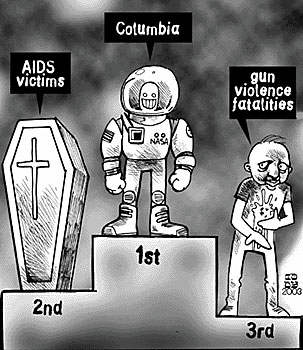
Illustration by Cody Angell
|
By Caitlin Hall
Arizona Daily Wildcat
Thursday February 6, 2003
On Feb. 1, 8,000 people died of AIDS or AIDS-related diseases. Cancer claimed the lives of 16,450. In Zimbabwe, 50 died when a passenger train collided with a freight train, setting fire to both. Hundreds died in civil war and military engagements. One thousand people were victims of fatal gun violence. Forty-four perished in a fiery explosion at a bank in central Lagos, Nigeria. And seven astronauts burned to death in a space shuttle minutes before their scheduled landing in the United States.
Every human death is a tragedy. Not every human death is front-page news.
To be sure, the lives of those who died on the space shuttle Columbia were remarkable, and their deaths were horrendous. But all life is miraculous, all death unthinkable. How do we choose who to celebrate, who to commemorate and who to ignore?
Is it a matter of circumstance? We become accustomed to death delivered in certain modes. Cancer, AIDS, heart disease - these are slow, familiar killers. Maybe death is more lesson-laden when it's untimely and spectacular.
Is it a matter of spectacle? Maybe it's not that we're unequipped for death after all, but rather that we're obsessed by it. What else can account for the ardor with which we watched looping footage of a distant dark spot and white streak in the sky Saturday morning? Several people interviewed by The Associated Press spoke of chasing the trail of debris around Texas - for the sheer thrill of it. It seems nothing is sacred enough to be exempt from our gory, voyeuristic zeal.
Is it a matter of the victim? Maybe we just don't want to examine the banal lives of ordinary people. Maybe death is only noteworthy if the deceased is noteworthy. But the unremarkable die in remarkable ways all the time. If we honor these astronauts for their bravery, why not honor those who sacrifice their lives knowingly and willingly for a cause? Though their aims were more noble and their deeds more righteous, the crew of the Columbia demonstrated no more bravery in its mission than a Palestinian suicide bomber who chooses to die in what he sees as defense of his homeland. No, meaning is not assigned on the basis of personality traits.
Is it a matter of symbolism? Undoubtedly so. The shuttle disaster is rife with symbolic meaning, as were the Washington D.C. sniper shootings, as was the World Trade Center attack. Here, the symbol is the vessel itself - the epitome of American military superiority, technological innovation and scientific infallibility.
Though it is widely recognized that it would be a monumental mistake to let this failure jeopardize the future of the space program, President Bush nevertheless felt the need to reassure the public that American exploration of space will boldly and fearlessly continue, no matter the peril - for when a technology that we have put our confidence in fails, so too does our confidence in technology.
So what determines our treatment of someone's passing? Is it some of these things? All of them? It doesn't matter; none of them are legitimate justifications for assigning more value to one death than another. Death - dirty or clean, venerated or unnoticed, premeditated or unforeseen - is death, and the implicit claim that it is only sometimes meaningful is shallow and callous.
There is value that exists besides symbolic value. Why don't we care about the 8,000 people who die every day of AIDS? Why don't we pay attention to random acts of gun violence? Why don't we value the lives of those who die as vocal champions of democracy in places like Iran, Nicaragua and China? Why don't we care about the firefighters who are only now falling ill from the toxic smoke they inhaled on Sept. 11?
Why do we avoid discussing morally significant death to the point of glorifying above all else senseless tragedy?
The point is not that the astronauts of the shuttle Columbia don't deserve our praise or our empathy. The point is, rather, that our whole system of assigning value to death is misguided. It makes no sense for the news of the shuttle crash to overwhelm our media and minds to the point that we are as oblivious to the ghastly deaths of 100 Nigerians and Zimbabweans as we were to their lives.
True, not every death can be front-page news. But let us not confuse recognition for significance.

